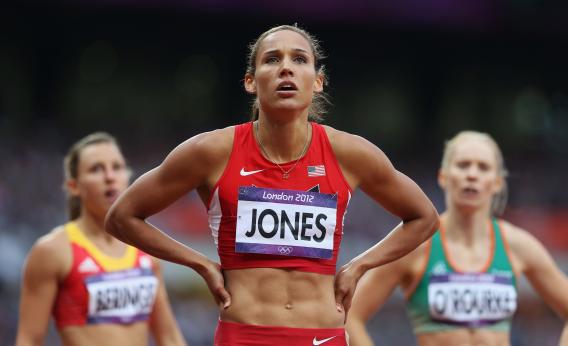If Lolo Jones needed inspiration as she stepped onto the track in London for the final of the women’s 100-meter hurdles yesterday, she could have taken plenty from the weird array of critics who rose up to complain about everything from her decision to publicly discuss her virginity to her post-surgery times in her signature event. She and her two faster teammates, Dawn Harper and Kellie Wells, ultimately finished second, third, and fourth after Australian Sally Pearson, whose time of 12.35 seconds set a new Olympic record. Jones, with a 12.58, ran her fastest race of the year, on the biggest stage she’s faced since undergoing surgery for a spinal condition last year.
And yet, the headlines continue to treat her like a loser. “Lolo Jones Can’t Win For Losing,” remarked Fox Sports. “Lolo Jones endures more pain after failing to medal in 100 hurdles,” said USA Today. And in Sports Illustrated, Tim Layden’s column was headlined “Lolo Jones misses glory in 100 hurdles.”
Jones herself was devastated by her failure to make the podium. “Honestly, I just feel like a big disappointment,” she told reporters, while also answering questions about the scathing New York Times story that attacked her character. “So I guess all the people who were talking about me, they can have their night and laugh.”
If Jones had won a medal, it would have made an exciting story, and a delicious rebuke to the Times. But there’s something a little weird about the notion that her critics were proven right—that the work she put in to getting back to the Olympics shouldn’t count, or counts less, because she finished fourth rather than third.
There’s space in between expecting someone who is a favored medal contender to perform according to their ratings and simply cheering them for being there. It’s possible to celebrate gymnastics all-around champion Gabby Douglas for overcoming the expectations of her own team coordinator, Marta Karolyi, who said that “I have never seen an average but good gymnast climb up to be the best in the world [in such a short time]. That’s the truth.” But we should also cheer Wojdan Shaherkani, the Saudi Arabian judoka whose Olympic competitive experience lasted 82 seconds before she was thrown, but who made history as the first Saudi woman to compete in the games. And there’s also room to laud Jones, who came into the Olympics, as her fiercest critic noted, with only the 20th fastest time in the world in 2012, for rising up in the ranks.
It’s not wrong for Olympians themselves to yearn for gold, the highest professional achievement available to them, and a potential guarantor of endorsement income that can free a family from debt or make them comfortable. But when we expect the same, it flattens the Olympic viewing and rooting experience to simply the medal count. The more we know about athletes’ histories, the expectations for them, and the sports they’re competing in that frankly most of us pay little attention to in the years in between Olympics, the richer our experiences will be, and the more we’ll truly understand what’s happening in individual events beyond a number on a screen or a body that’s first over the line in a photo finish.
If you only care who wins gold, silver, and bronze, you might as well just tune in for the medal table update at the end of NBC’s nightly broadcast rather than wasting time on the pesky events themselves. And the people who treat Jones as some sort of loser or disappointment for being the fourth-best runner in the world in her discipline might consider whether a new approach to judging performance might let them enjoy the Olympics more, and help them evaluate the extraordinary people who compete in them with more dimensions and more fairness.
